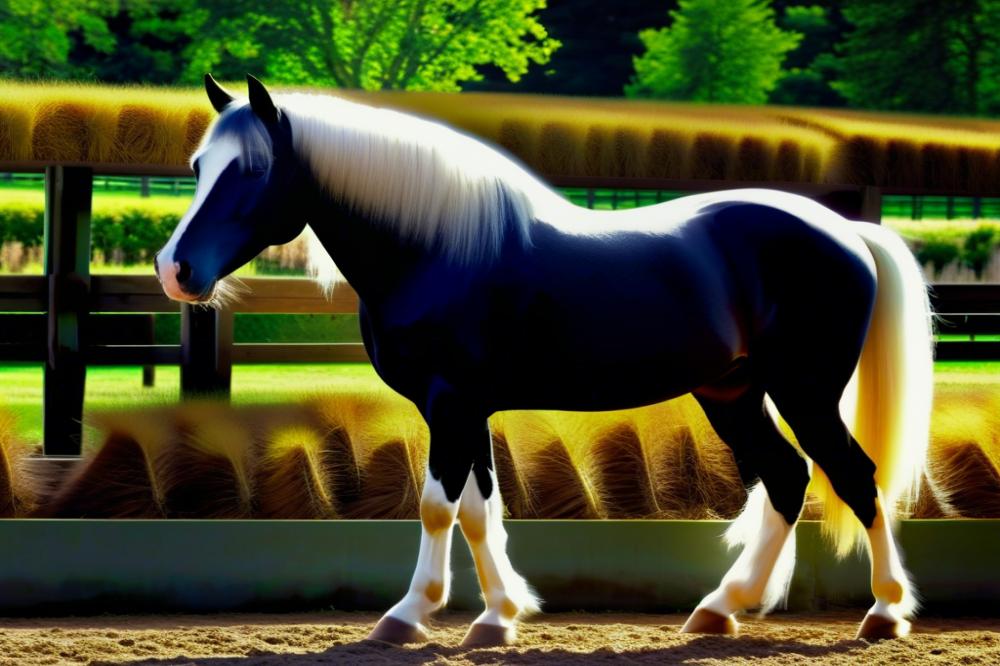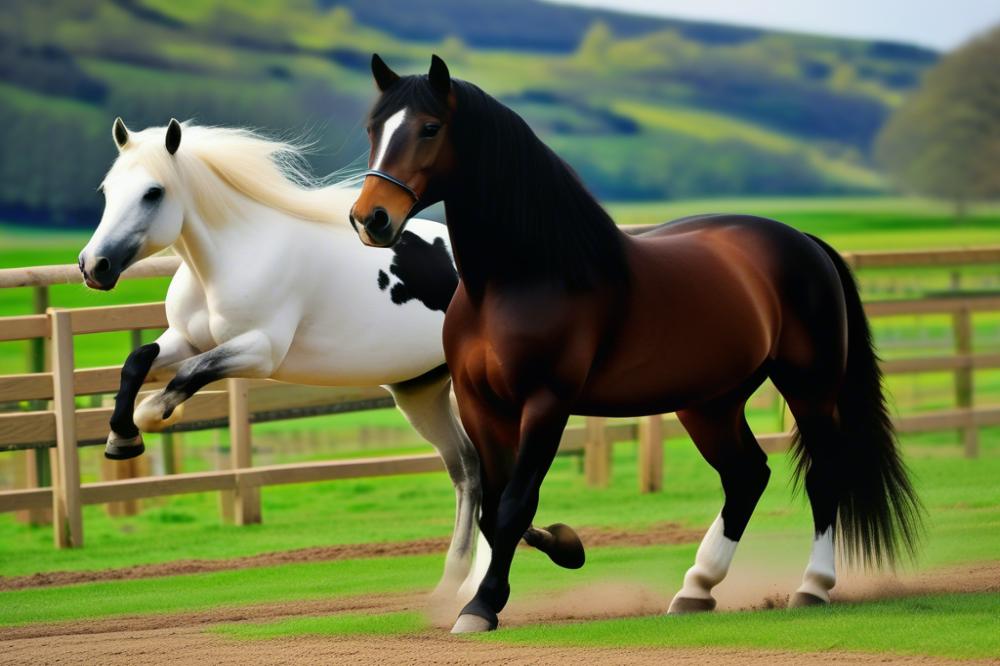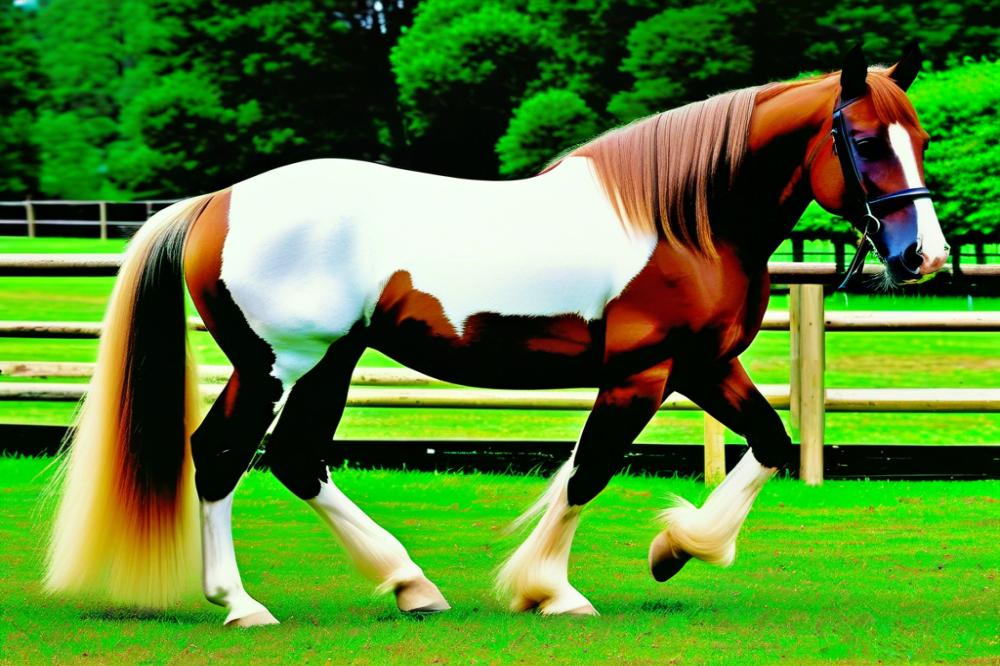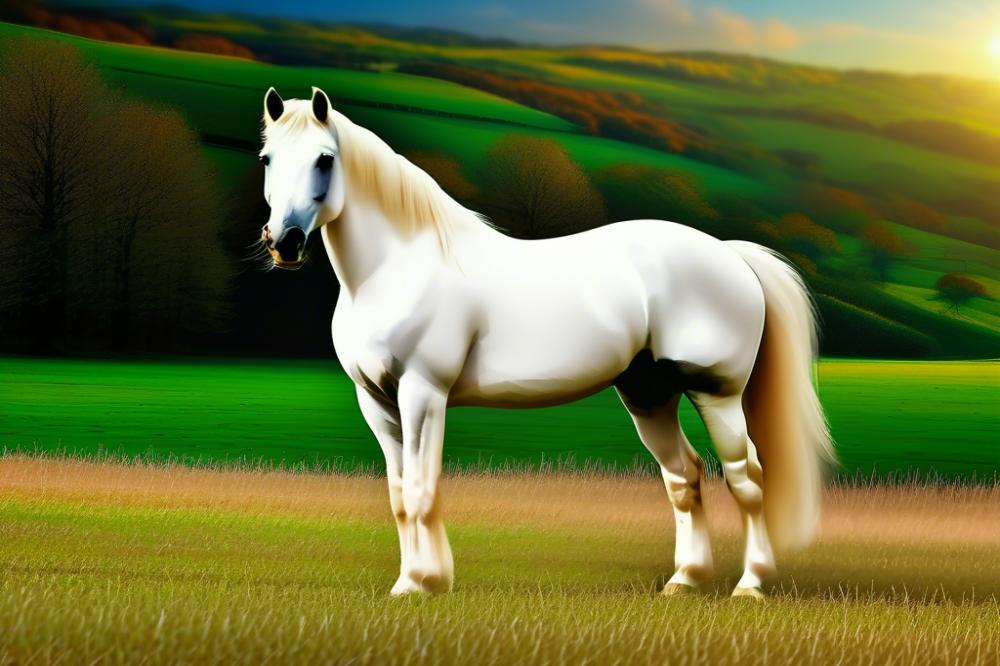Overview of the Welsh Pony and Cob
The Welsh Pony and Cob are a fantastic part of the equestrian world. These breeds have come a long way from their origins in the rugged hills of Wales. With their sturdy builds and colorful personalities, they have captured the hearts of riders and horse lovers alike. Whether you’re a beginner or a seasoned pro, these ponies and cobs offer something for everyone. But what makes them stand out in the diverse tapestry of horse breeds? Let’s dive into some horse breed information that highlights their unique traits.
Importance and Popularity in Various Equestrian Activities

These charming equines excel in a multitude of activities. From show jumping to dressage, their strong physique and graceful movements always impress. Many riders cherish their versatility. Welsh traits, such as intelligence and a friendly disposition, make them excellent companions for both work and play. You might find them trotting around a riding arena one minute and performing wonderfully on a countryside trail the next. Isn’t that just remarkable?
Horse care for these breeds is often straightforward, as they are generally hardy animals. Being equipped for various climates, it’s good to have a blanketing guide in your arsenal for those chillier days or rainy spells. They do well with regular exercise and love to be part of a bustling barn community. Social creatures, they thrive on interaction, so don’t be surprised if they start nuzzling you for attention!
Can you ride a horse with a capped hock? That’s a question many ask, especially when considering these breeds. Generally, it depends on the individual horse and the conditions. However, most Welsh ponies and cobs are pretty tough cookies, ready to take on challenges with their resilient nature.
To sum it all up, the Welsh Pony and Cob have carved out a niche in the equestrian world that’s hard to overlook. Their combinations of size, strength, and spirit make them a beloved choice for riders everywhere. So whether you’re looking for a show partner or a trusty trail buddy, these lovely ponies have got your back, hooves, and all!
History and Origins

Historical Development of the Welsh Pony and Cob
The story of this remarkable breed begins in the rugged hills of Wales. Some experts believe that local ponies have roamed these lands for hundreds of years. They mixed with other horse breeds, creating the splendid pony we see today. Originally, these ponies were used for work, pulling carts and carrying loads. Over time, their strength and endurance became legendary among farmers and miners.
People soon noticed these horses possessed remarkable traits. Their ability to navigate tough terrains made them valuable companions. They also became popular for riding, especially for children and younger riders. After all, what could be better than a sturdy pony to teach a child the joy of riding? Parent-approved, of course!
Regional Influences and Breeding Practices
Different regions of Wales contributed to the unique pony traits we know today. Breeders selectively paired ponies with desirable characteristics. This careful attention to breeding brought about variances in size and temperament. The mountain regions favored stronger ponies, while lower lands produced those with a bit more flair.
Traditionally, these ponies were bred for utility. However, breeders began to focus on conformational aspects. As horse care improved over the years, attention turned towards improving bloodlines. The result? A mix of beauty and functionality, making them standout horse breeds.
Recognition and Classification by Equestrian Organizations
Numerous equestrian organizations have taken notice. They recognize these ponies for their outstanding qualities. The Welsh Pony and Cob Society was established in 1901, celebrating these incredible horses. This organization helps maintain breed standards and promotes horse profiles.
Breeders and owners alike enjoy the perks of this recognition. It means access to competitions, events, and showcases. Enthusiasts often seek out horse breed information. Such resources help them learn more about breeding practices, showing standards, and general pony care. This solid foundation continues to support the breed, ensuring their place in the equine world.
Regional affiliations have also played a role in classification. Different types exist, each suited for various activities, such as driving or jumping. Their versatility makes them popular not only in Wales but across the globe. With a bright future ahead, the legacy of these admirable ponies lives on.
Physical Characteristics

Description of size and weight variations
The Welsh Pony and Cob come in various sizes. They are grouped into sections based on height. Welsh Ponies range from about 12 to 14.2 hands high. On the other hand, Cobs can be taller, reaching up to 15.2 hands or more. Their weight varies quite a bit, too. A Welsh Pony might weigh between 400 to 800 pounds, while a heavier Cob can tip the scales at over 1,000 pounds. You could say that they have a ‘little bit for everyone’ in the equine world.
Color and coat characteristics
These horse breeds exhibit a delightful array of colors. You can find them in shades such as chestnut, bay, black, and grey. Some even sport a dappled coat that’s like a fancy garment for a show! Their manes and tails are often thick and flowing, giving them a regal look. It’s quite common to see them with a mix of colors, thanks to their strong genetic traits. Coat maintenance plays a big role in horse care; grooming keeps their fur shiny and healthy.
Distinctive features of the breeds
Every horse profile tells a story, and these breeds are no different. Welsh Ponies often have a refined head that gives them an elegant appearance. They also sport large, expressive eyes that seem to tell you secrets! The Cob, however, is more muscular and stocky, built for strength and stamina. Welsh traits include a strong back and powerful legs, making them ideal for various activities. People who know these horses often say their friendly disposition is just as striking as their physical traits. With so much personality packed into a sturdy frame, they continue to win hearts across many riding disciplines.
Temperament and Behavior
General Temperament Traits of Welsh Ponies and Cobs
Welsh Ponies and Cobs are known for their friendly nature. These horse breeds possess gentle spirits that endear them to many. Owners often describe them as cheerful and willing. With a good sense of humor, they seem to enjoy life on the farm. They tend to bond closely with their human companions. Such connections lead to trust and mutual respect. If you’re looking for a buddy who loves to explore, this breed fits the bill. Their playful antics can bring a smile even on the toughest days.
Intelligence and Trainability
Intelligence shines through in these equine characteristics. Welsh Ponies and Cobs pick up new skills quickly. They thrive on mental challenges and enjoy learning. Training sessions can turn into fun games, thanks to their cleverness. Always eager to please their riders, they often excel in various disciplines. Consistent, patient training methods work best. Rushing things can backfire. A rewarding approach encourages them to shine. It’s no surprise that they often succeed in shows and competitions.
Compatibility with Riders of Different Experience Levels
This breed can be a fantastic choice for riders of all skill levels. Beginners often feel more confident riding these gentle giants. Their calm demeanor fosters a sense of security. Meanwhile, experienced riders can enjoy the energy and athleticism they bring. Many find that Welsh Ponies and Cobs respond well to varied riding styles. Whether you’re just getting your feet wet in horse care or you’re a seasoned pro, they adapt smoothly. It’s like riding with a friend who’s always got your back. Families love how this breed can be both a gentle companion for youth and a significant challenge for advanced riders. Versatile like that, they make learning fun!
Uses and Disciplines
Welsh Ponies and Cobs are involved in a variety of activities. They are perfect for competitive riding, and it’s no surprise that they shine in disciplines like show jumping, dressage, and eventing. With their unique blend of strength and agility, these horse breeds can tackle challenging obstacles with ease.
In addition to riding, many folks love to use them for driving. Picture a charming carriage pulled by a sturdy Cob, clip-clopping along a scenic route. It’s hard not to smile at that scene! These horses possess strong equine characteristics that make them reliable when working in harness. Their calm demeanor is a bonus, especially for beginners.
Leisure activities also attract pony lovers. Whether it’s a weekend trail ride or fun games at local shows, they fit right in. Children adore these ponies. With their friendly nature and manageable size, they become trusted companions for youngsters. Welsh traits, like cheerful dispositions and an eagerness to please, add to their appeal as family horses.
Horse care becomes simpler with them, too. Families find that their easy-going personalities mean less hassle during grooming or tacking up. There’s a warm bond that develops, making chores feel less like work and more like a fun activity to enjoy together.
When looking at horse breed information, it’s easy to see why they’re so versatile. They can go from classroom to competition in a snap. It’s like tossing on your sneakers and heading out for a game—simple yet satisfying! Many riders find their confidence grows with a Welsh Pony or Cob. It’s like stepping onto a reliable friend who’s always up for an adventure.
So whether you’re competing in a show ring or enjoying a cozy ride in the countryside, these ponies and cobs ensure a delightful experience. After all, nothing beats sharing horse stories and making memories with a four-legged partner you can trust!
Care and Management
Feeding and Nutritional Needs
Good nutrition is crucial for any horse breeds. When it comes to these ponies and cobs, their diet should primarily consist of high-quality forage. Hay and pasture grasses are the backbone of their meals. Grains can be added, but many owners choose to keep it simple. Some might say feeding them is like prepping for a big family feast—keep it balanced but not too generous.
Water should always be available too. Without it, no creature can thrive. It’s like the air we breathe; they just can’t live without it. So, check those water buckets regularly. Additionally, consider their age and activity level. Growing youngsters have different needs compared to a seasoned show pony. Always note how much each individual eats.
Health Considerations Specific to the Breed
Health is a top priority when dealing with this breed. Regular veterinarian checkups are non-negotiable. They can detect conditions early, and a stitch in time saves nine, as they say. Some common issues include laminitis and certain skin conditions. Be particularly vigilant if your equine friend is overweight; that can lead to problems.
Another aspect to remember is dental care. Just like our own teeth, horse teeth need attention. Float those teeth at least once a year for a happy mouth. Furthermore, vaccinations are key. Keeping up with them ensures your pony stays safe from various diseases.
General Grooming and Maintenance Practices
Grooming is not just for looks; it’s part of good horse care. Regular brushing keeps their coat shiny and healthy. Plus, it’s a great bonding experience. It’s amazing how a good scratch can be as delightful for them as it is for us after a long day.
Pick their hooves every day. Ignoring this task can lead to serious problems. A horse with sore feet can’t perform, and who wants a grumpy equine buddy? Regular trims by a qualified farrier are essential. Those feet need a professional’s touch.
Lastly, keep an eye on the signature Welsh traits, such as their long manes and tails. These can get tangled easily. Spending a few minutes detangling can save hours of trouble later. Grooming is not only a chore; it’s part of the joy of owning such splendid horse breeds.
Breeding and Selection
Factors to Consider When Breeding Welsh Ponies and Cobs
Breeding horses is a big responsibility. It’s not just about wanting a cute foal; it’s about planning for the future. Think about the purpose of your breeding. Are you looking for a fantastic riding companion, a showstopper in competitions, or a sturdy companion for the kids? Each of these goals requires different attributes. Also, consider the environment where the horse will live. Does your land have enough space? Space can impact a horse’s behavior and happiness.
Temperature and climate are other key players. Warmer areas might lead to the need for lighter coats, while colder zones require robust fur. Remember, the health of the mare and stallion is also paramount. Their well-being directly affects the foal’s health too. Have thorough health checks done before making any breeding choices.
Key Characteristics for Selecting Breeding Stock
Choosing the right breeding stock can feel a bit like finding a needle in a haystack—when you think you’ve found the one, there’s always more to consider. Look for good conformation. Well-structured ponies and cobs typically have the best chance of passing on desirable traits. Strong bone structure and a well-shaped body are crucial. Then, there are temperaments. A calm and approachable horse is always easier to handle, making training smoother down the line.
Don’t forget to delve into their lineage. Understanding pedigree can give valuable insights into potential equine characteristics. Does the horse have a family history of soundness? Are they known for competing well in shows? Ask yourself these questions. Take a moment to observe their movement and attitude. A horse that moves gracefully and confidently can be a good sign.
Ethical Breeding Practices and Genetic Health
Ethical breeding might sound a bit serious, but it’s simply about doing the right thing. Protect the future of the horse breeds by focusing on genetic health. Responsible breeding practices mean avoiding any close relatives. This helps reduce the likelihood of inherited diseases. Use DNA testing to check for possible genetic disorders in both parents. This thorough approach can prevent future health problems for the foal.
Also, prioritize overall welfare. Breeding should not just be about looks or competition prowess. Horses raised in healthy settings are happier and often end up being better performers. Adopting humane practices can mean ensuring proper horse care throughout the process. Always strive to place the needs of the horses first. Breeding can be a rewarding journey when approached with love and responsibility. Remember, it’s not just about creating the next winner but also about building a healthy and vibrant equine community.
Wrapping Up the Welsh Wonders
In summary, the Welsh Pony and Cob breed holds a special place in the hearts of equestrians around the globe. Their charm, versatility, and intelligence make them not just good companions, but remarkable partners for riding, driving, and all sorts of adventures. From competitive events to leisurely trail rides, these ponies and cobs have proven their worth time and again. Anyone who has spent a day with these creatures can attest to their playful spirits and undeniable personalities.
Thinking of adding one of these graceful ponies to your life? You’re in for a treat! The joy they bring is second to none. Many enthusiasts find that their connection with horses enriches their day-to-day experiences. Don’t worry if you’re a beginner in horse care. With a bit of guidance, proper education, and love, you can easily become a proud owner. Remember, though, it’s essential to plan for everything, from horse feed bin ideas to routine grooming. And speaking of grooming, does horse tail hair grow back? Absolutely! So, a little mishap in the mane department is nothing to fret about.
As we look to the future, it’s clear that the Welsh breed faces challenges—just as any popular breed does. The commitment to preserving their lineage is critical, especially when it comes to responsible breeding and care practices. Thankfully, many organizations are dedicated to promoting the health and welfare of these horses, ensuring they remain a staple in the equestrian world. In conclusion, belonging to a community filled with those who share a passion for these equines can enhance your journey. So saddle up and dive into the delightful world of Welsh Ponies and Cobs; they’ll bring joy and companionship that lasts a lifetime!



